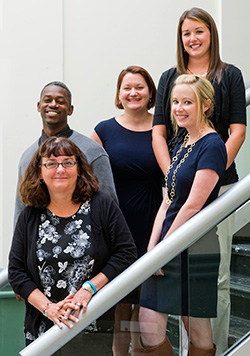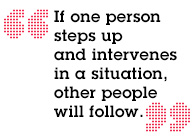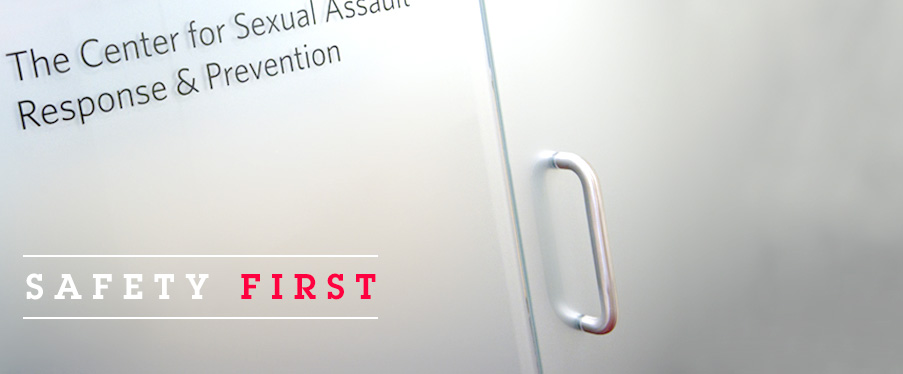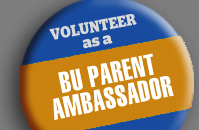Parent Magazine
Advocating for Students
New sexual assault response center combines prevention and counseling.
By Rachel Johnson (MET’11)
Photos by Cydney Scott

The SARP team (clockwise from front left): Director Maureen Mahoney, Health and Prevention Educator Antonio Arrendel, Crisis Intervention Counselor Beth Kozik, Administrative Coordinator Jenna Vaillancourt, and Crisis Intervention Counselor Jessica Sparks.
Whether it’s their first day of kindergarten or when they have kids of their own, your children and their well-being are always on your mind. When children live away from home for the first time, parents want to know that they are taking care of themselves—and staying safe. In fall 2012, Boston University opened the Sexual Assault Response & Prevention Center (SARP) to address the difficult topic of sexual assault on campus and to train the community to prevent it. Fittingly, students played a key role in the center’s formation—the idea for bringing prevention and crisis counseling under one roof came from members of the Center for Gender, Sexuality & Activism. According to SARP director Maureen Mahoney, who has been a crisis counselor at BU for more than 18 years, it’s rare for institutions to combine response and prevention. She spoke with Parent magazine about how her team can help students—and parents.
Parent: What services does the center offer?
Maureen Mahoney: Advocacy. We accompany students to the emergency room, and help them get any medical care or exam they might need. We help with legal situations. I’ve helped students tell their parents what happened; I’ve helped students who needed some assistance or leniency with academics or jobs. SARP also provides individual therapy, and we’ve started a group for survivors of sexual assault. We give students accurate, useful information so they can make decisions that they feel comfortable with. We don’t tell them what to do, but we help them negotiate the situation with other people in their lives. It depends on what’s most helpful, and what the students want. We can be with a student from the first time they contact us until they graduate. A clinician is always on call, 24 hours a day, 365 days a year. We also do prevention initiatives, like “Take Back the Night,” and about 1,700 student leaders have gone through our “Step Up. Step In. BU” bystander training program.
What is bystander training?
 Research has shown that if one person steps up and intervenes in a situation, other people will follow. We give students scripts for getting involved. It can be helpful for people to have a concrete way to intercede—a way to check in with a friend who seems to have had too much to drink, let’s say, about whether he or she is safe. So the training prepares people to help if they see someone in a bad situation. We’ve trained student-athletes, resident assistants, club leaders, any student who’s expressed an interest. And President Brown and the Dean of Students office require certain groups to partake. I think it’s been really, really successful, and a lot of students have been engaged by it.
Research has shown that if one person steps up and intervenes in a situation, other people will follow. We give students scripts for getting involved. It can be helpful for people to have a concrete way to intercede—a way to check in with a friend who seems to have had too much to drink, let’s say, about whether he or she is safe. So the training prepares people to help if they see someone in a bad situation. We’ve trained student-athletes, resident assistants, club leaders, any student who’s expressed an interest. And President Brown and the Dean of Students office require certain groups to partake. I think it’s been really, really successful, and a lot of students have been engaged by it.
Why is it important to have a center like SARP on campus?
One reason is the age group of our students; statistically, they’re more at risk for experiencing a sexual assault than any other age group. Having SARP here puts prevention up front, so BU becomes known as a place where your peers don’t allow you to be harmed or to harm another person. Even though “Sexual Assault” is in our name, we also focus on the situations that allow sexual assault to happen, like violence in interpersonal relationships—helping people understand what is a healthy relationship, what is a controlling relationship, and how to get out of a relationship that’s not helpful for them.
What follow-up is there after a visit or call?
We reach out to students. A student’s initial response is often to just want life to go on as usual. And part of that is being able to, for a period of time, suppress what happened. And we understand that. We’ll often talk about that with students in the initial meeting. We follow up, in a noninvasive way, by email or texting. I’ll say, “Hey, how’re you doing? I’m still here. Let me know.” We have a secure messaging system where we can see if a student has read the message. It’s not always important that the student get back to us right away; we just want to remind them that we’re here.
What can you say to parents?
That usually depends on the level of involvement the student wants. I’ve met with students and their parents together; that’s not an unusual thing to do. If a student gives me permission to talk to parents, I will talk to the student about the parameters of that. And if a parent calls, we will always listen. But we’re bound by law to confidentiality, so unless a student’s immediate safety is a concern, we can’t disclose information to anyone, even parents. But we will always listen to a parent who calls. And often, we’ll help students talk to their parents about what happened. SARP also has a guide for parents.
What do you like best about the center?
The luxury of being able to see any student. A misconception about the center I’ve heard is “I don’t have the BU insurance, so I can’t go there.” We do not charge students or their insurance—SARP services are part of the student health fee. Also, the possibilities. We’ve had so much administrative and student support; it can help us make a real impact in individuals’ lives.
What would you most want parents to know about the center?
 That it exists. That we’re here to advocate for students and help make them safer. And that talking to students about not harming each other, about respecting each other, can happen away from BU, too.
That it exists. That we’re here to advocate for students and help make them safer. And that talking to students about not harming each other, about respecting each other, can happen away from BU, too.
SARP is located at 930 Commonwealth Avenue, and the staff may be reached at 617-353-SARP (7277).







May 7, 2013
I have been thinking about having my daughter take a quick self defense class (hope she doesn’t ever have to use it) to free herself/get out of a situation/hold. Does SARP offer any classes of such nature? I think students should be taught techniques to at least try to free themselves in such situations.
May 7, 2013
Hi Urvi,
Encouraging your daughter to take a defense class is a smart idea. The Boston University Police Department offers a Rape Aggression Defense program (RAD) to female students. Please visit the BUPD webpage for more information about the course – http://www.bu.edu/police/services/RAD/.